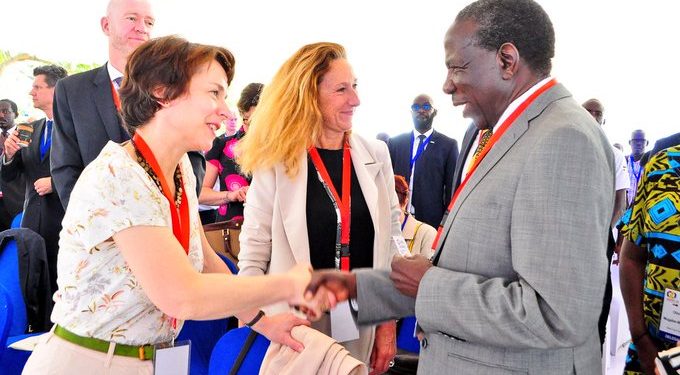By CHIMPREPORTS
By Happy Christine
Uganda’s Finance Minister, Matia Kasaija, expressed support for the European Union’s Global Gateway during the ongoing 3rd Uganda-European Union Business Forum in Kampala. Kasaija emphasized that the strategy would enhance Uganda’s ability to access equity for financing projects, particularly in infrastructure and other strategic sectors. He sees the Global Gateway as instrumental in building the capacity and resilience of Uganda’s private sector to stimulate economic growth.
The Global Gateway initiative involves Europe combining efforts and funds from the European Union, its Member States, financial institutions like the European Investment Bank, and national development banks and implementing agencies of EU Member States. The goal is to deliver targeted investments, engage with the private sector for transformative change, and work with partner countries like Uganda to address their priorities.
Myriam Ferran, Deputy Director General at DG International Partnerships (DG INTPA), European Commission, highlighted that the EU offers attractive financial conditions to reduce risks and improve debt sustainability under the Global Gateway. She emphasized the collaborative and sustainable approach of the initiative.
Minister Kasaija underscored the mutually beneficial development cooperation between Uganda and the EU, suggesting that it should be expanded and deepened. The Global Gateway’s focus on priority areas aligns with Uganda’s development agenda, making it a strategic and supportive initiative for the country.

The forum marks a pivotal moment for Ugandan businesses seeking international expansion and capitalizing on global partnerships. Positioned against a backdrop of economic collaboration and strategic dialogue, the forum acts as a catalyst for growth, providing Ugandan companies with a platform to seize opportunities, form partnerships, and explore new avenues for prosperity.
The Finance Minister highlighted the resilience of Uganda’s exports to the EU, showcasing a remarkable 53% increase from USD 502.5 million in FY 2019/2020 to USD 770.41 million in FY 2022/23, even during the peak of the COVID-19 pandemic. He noted that, as of 2022, the EU stands as Uganda’s largest source of foreign direct investment (FDI), contributing over 38% of FDI inflows.
Additionally, the EU plays a crucial role in Uganda’s tourism sector, accounting for more than 50% of European arrivals. The UEBF speakers articulated a compelling narrative, shedding light on tangible benefits for Ugandan businesses, ranging from access to European markets to technology transfer and innovation.
Investments are flowing into various sectors, including energy and agribusiness, and officials anticipate that the EU’s partnership with Uganda will spur economic growth and create new investment opportunities. The Chairman of the Uganda Investment Authority emphasized the forum’s role in fostering durable business partnerships, sustainable growth, and inclusive development.
Ambassador Jan Sadek, representing the European Union, reiterated the EU’s commitment to strengthening trade and investment ties with Uganda, emphasizing the mutual benefits of the partnership. The forum is poised to shape Uganda’s business landscape and contribute to its economic transformation, with a strategic focus on areas such as commercial agriculture, mineral value addition, tourism, manufacturing, and enabling infrastructure.

The UEBF has played a crucial role in attracting European investment and enhancing trade opportunities. Ambassador Jan Sadek emphasized the EU’s Global Gateway investment strategy, designed to leverage investments for sustainable and inclusive growth in partner countries.
The forum provided Ugandan businesses with a platform to access European markets, with discussions focusing on trade policies, market dynamics, and regulatory frameworks. Through strategic partnerships and market intelligence, Ugandan companies can explore lucrative opportunities across sectors, reducing reliance on traditional markets and diversifying export portfolios.
Technology emerged as a key driver of growth, with dedicated sessions on technology transfer, innovation, and digital infrastructure. By leveraging European expertise, Ugandan businesses can enhance productivity, streamline operations, and adopt innovation-driven strategies for sustainable growth.
Capacity building and skills development were highlighted as critical enablers for business success, with workshops and training programs empowering local enterprises to navigate complex business landscapes effectively.
Sustainable development took center stage, with discussions on eco-friendly technologies, renewable energy solutions, and corporate social responsibility. Integrating sustainability principles into business practices enables companies to enhance competitiveness, mitigate environmental risks, and contribute to a greener future.
Networking and collaboration opportunities were abundant, allowing Ugandan businesses to connect with potential partners, investors, and stakeholders. Interactive sessions and business matchmaking events facilitated meaningful connections, fostering an ecosystem of innovation and growth.
Stakeholders expressed optimism for the future, anticipating new partnerships, opportunities, and pathways to prosperity. The shared vision for economic development and mutual growth positions Uganda and the European Union for collaboration, innovation, and prosperity, promising a brighter future for Ugandan businesses and communities.







Discussion about this post